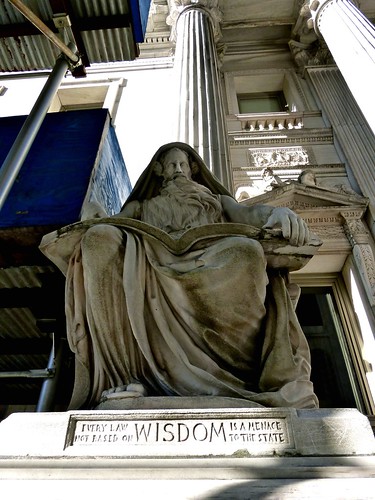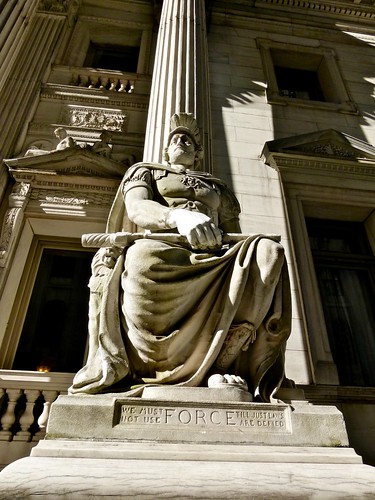October 27, 2023
"I believe that scripture, the Bible is very clear that God is the one that raises up those in authority."
January 7, 2022
"I will stand in this breach."
Said President Biden, in his speech yesterday. You can encounter the line in context at the end of my previous post.
This post is to examine the idiom. What are we talking about when we say "stand in the breach"? I think of Shakespeare's "Once more unto the breach." It's about taking up a warlike frame of mind:
Once more unto the breach, dear friends, once more;
Or close the wall up with our English dead!
In peace there's nothing so becomes a man,
As modest stillness and humility;
But when the blast of war blows in our ears,
Then imitate the action of the tiger:
Stiffen the sinews, conjure up the blood...
So "the breach" is a broken open place in some fortifying wall, and the idea is to move through that space, into battle. If they don't move forward, the argument is that they will pile up dead until their bodies fill that space — close the wall up.
But that's about using the breach as an entry point into battle, not just standing there, which seems to be a poor military tactic.
From about the same time period, there is the King James Version of the Bible (1611), Psalm 106:23:
July 20, 2020
"You have someone who is not afraid of anyone and only afraid of God... and is at a 132 I.Q. genius that literally went to the hospital because his brain was too big for his skull...."
Said Kanye West at his rally yesterday. He's running for President. Do you think he's out of his mind enough to be President?
Here's the part about abortion:
June 28, 2017
"A man yelled 'Freedom!' as he crashed his vehicle into Arkansas' new Ten Commandments monument early Wednesday..."
In the video [on Michael Reed's Facebook page], the sky is dark and the Arkansas Capitol's dome is visible. Music is heard followed by a female voice, likely on the radio, saying, "Where do you go when you're faced with adversity and trials and challenges?" The driver is then heard growling, "Oh my goodness. Freedom!" before accelerating into the monument. The vehicle's speedometer is last shown at 21 mph (33 kph) and then a collision can be heard. Arkansas' monument fell from its plinth and broke into multiple pieces as it hit the ground. The debris had been cleaned up by midmorning Wednesday....By the way, in the Biblical story, Moses breaks the 10 Commandments tablets. Did you ever understand why? There are many explanations. Here are 4 explanations.
Arkansas' granite monument weighed 6,000 pounds (2,721 kilograms). It was installed Tuesday morning on the southwest lawn of the Capitol with little fanfare and no advance notice. A 2015 law required the state to allow the display near the Capitol, and a state panel last month gave final approval to its design and location.
March 3, 2016
About tonight's debate, Chris Wallace likens his moderator role to that of a referee at a boxing match.
And, referring to the last debate: "I thought that if you could see someone acting like a president on the stage, you have better eyesight than I do. Having said that, in the end, if the candidates want to act like damn fools, I’m not going to stop them."
That's quoted in the NYT article "Fox Moderators to Face Donald Trump in Thursday’s Debate." (Ha! Funny headline. The vector of who's facing whom is reversed. It's the moderators who have to face Trump, not Trump facing them.)
It should be noted that Megyn Kelly is back, and Trump seems ready to take questions from the woman he may have accused of menstruating.
I wanted to link to my old post discussing Trump's enigmatic old wisecrack "blood coming out of her wherever" — at the time, I just said "He went menstrual on her" — and my search of the archive, using the terms "megyn" and "blood," caused me to discover something that perhaps no one has yet noticed. Trump's mind went to "blood" the day after the debate, but during the debate itself, the word "blood" appeared in a very vivid context.
Megyn Kelly said she wanted to know if any of the candidates had "received a word from God on what they should do and take care of first." She asked Ted Cruz and then Kasich and finally turned to Scott Walker, who said:
I'm certainly an imperfect man. And it's only by the blood of Jesus Christ that I've been redeemed from my sins. So I know that God doesn't call me to do a specific thing, God hasn't given me a list, a Ten Commandments, if you will, of things to act on the first day. What God calls us to do is follow his will. And ultimately that's what I'm going to try to do.At the time, I said:
Nicely done, I think. Sincerely religious, complete with "the blood of Jesus Christ," but manifested in public life in ways that are not noticeably different from being a kind, decent person in a way that works for people of any religion or no religion.Words stick in your mind and recirculate into new contexts. It occurs to me now that Trump's striking use of "blood" the next day came not from thoughts of women on their period but the dramatic image of blood that was Scott Walker's go-to reaction when asked about religion. I wonder what Trump thought about the man who stood right next to him that night last August and spoke so directly and openly in the kind of stark religious words that Trump — for all his blunt speech — decorously eschews.
But Scott Walker is long gone and we're many debates down the road from that night last August...
... and there will be far fewer men on the stage tonight. We're not down to 2, so it's not quite the boxing match that the metaphorical mind of Chris Wallace envisioned, but there will be blood.
And by the way, what is the origin of the phrase "there will be blood"? Who said it first? Was it Daniel Day-Lewis?
Oh, no! It was GOD:
Then the LORD said to Moses, "Say to Aaron, 'Take your staff and stretch out your hand over the waters of Egypt, over their rivers, over their streams, and over their pools, and over all their reservoirs of water, that they may become blood; and there will be blood throughout all the land of Egypt, both in vessels of wood and in vessels of stone.'"
June 10, 2014
"Every law not based on WISDOM is a menace to the state"/"We must not use FORCE till just laws are defied."


According to this PDF from the court, the "Wisdom" sculpture is "an old man." It doesn't say it's Moses. Just some old guy. But the "Force" sculpture, we're told "is a composite of General Ulysses S. Grant, General Nelson A. Miles, and Admiral Francis M. Bunce." Actually, there is a Moses statue elsewhere on the building, at the roof line:

There are various other historical figures, like Zoroaster and Confucius, and I see in the PDF that Muhammad was one of them until his image was removed and destroyed back in 1955, at the request of the governments of Egypt, Pakistan, and Indonesia.
Be that as it may, it's the inscriptions that fascinate me. I think that these are original aphorisms, composed for these sculptures, and that they were intended to paraphrase widely understood propositions of American law. Nevertheless, the precise words, taken literally, are quite extreme. I was surprised to see them on the courthouse. How differently cases would come out if these 2 phrases were binding law, taken seriously?
May 30, 2014
Hillary self-refutes: "I will not be a part of a political slugfest on the backs of dead Americans."
From her forthcoming book, previewed in Politico.
By "self-refutes," I mean a statement that asserts something and cancels it out simultaneously. I'm trying to think of some famous examples of this, but failing that, I'll just make up a sentence that demonstrates the kind of statement I'm talking about: I will not indulge in hyperbole as I present myself to you as the most qualified individual who has ever run for the office of President of the United States.
Ah! I thought of a well-known example: any statement that begins with the words "Not to mention." And here's one I found on the internet: "There are no absolute claims."
And here's something: "Internal Contradiction: Fallacies of Self Refutation." That quotes Aristotle, — "One cannot say of something that it is and that it is not in the same respect and at the same time" — and Thomas Paine:
"But granting the grammatical right, that Moses might speak of himself in the third person, because any man might speak of himself in that manner, it cannot be admitted as a fact in those books, that it is Moses who speaks, without rendering Moses truly ridiculous and absurd: -- for example, Numbers xii. 3: "Now the man Moses was very MEEK, above all the men which were on the face of the earth." If Moses said this of himself, instead of being the meekest of men, he was one of the most vain and arrogant coxcombs; and the advocates for those books may now take which side they please, for both sides are against them: if Moses was not the author, the books are without authority; and if he was the author, the author is without credit, because to boast of meekness is the reverse of meekness, and is a lie in sentiment."Let us do unto Hillary as Thomas Paine did unto Moses.
IN THE COMMENTS: Paul Zrimsek said:
Bush lied, people [censored]!



